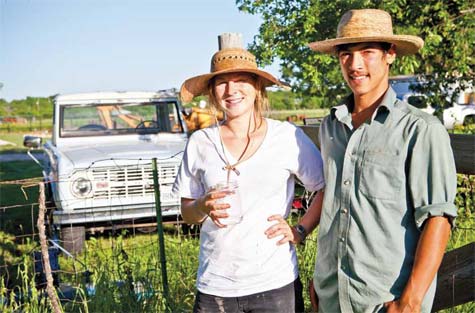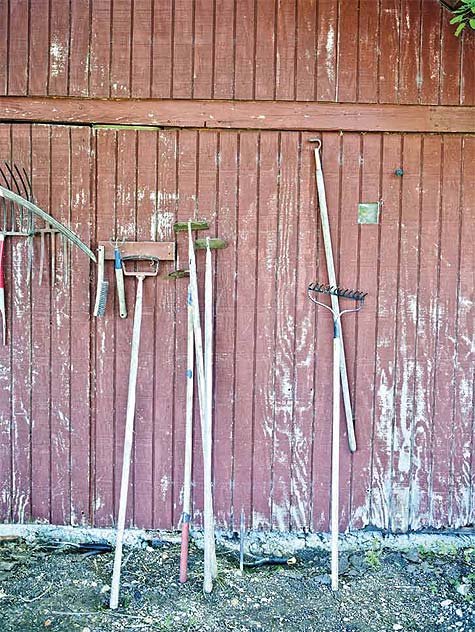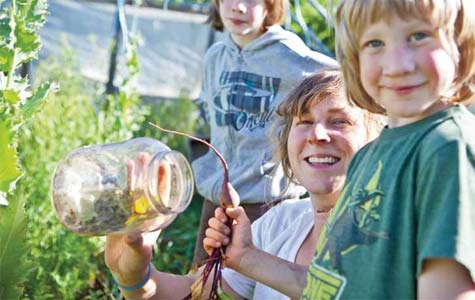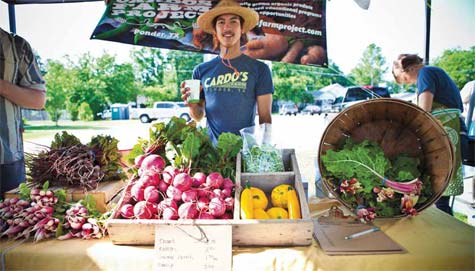CARDO’S FARM PROJECT
 Amanda Austin & Dan Moon
Amanda Austin & Dan Moon
PHOTOGRAPHY BY THORPE GRINER
chatty group of homeschoolers and their parents follow Amanda Austin on a tour of Cardo’s Farm Project, a small community farm and education center in Ponder, west of Denton. First, they pack inside the steamy greenhouse where seedlings germinate before they’re planted into the fields. Then Amanda leads them to the grassy chicken yard, where hens peck at the ground, protected by a rooster’s watchful eye. “This is their home,” she explains before unlatching the gate. “How do we act when we’re guests in someone’s home?” That’s all Amanda needs to say to secure the cooperation of the youngsters as well as the adults. As the chickens eat dinner, the group politely passes by, across the lawn toward the chicken coop. “Who’s ready to go collect eggs?” she asks.
“Yea!” a toddler exclaims, clapping his hands. “I love eggs!” The children form a circle, as per Amanda’s instructions. She reaches underneath the nesting hens and passes around their freshly laid eggs.
The children feel their warmth in their hands. So this is where eggs come from.
Cardo’s Farm Project started as an agricultural experiment committed to growing produce through sustainable methods without chemical fertilizers, pesticides or herbicides. It now also offers workshops, classes and tours for adults and children, special events and the occasional meal created from the farm’s produce.
Amanda, a native Texan, originally worked this land as a farmhand for Rick “Cardo” Orndoff, who retired as owner of a small sprout farm business, but continued to grow produce on the property.
Amanda, in college at the time, took off one summer to be an educator at a California farm. After graduation, she served as an intern at Common Ground Farm in Beacon, New York.
There she met Daniel Moon, a self-proclaimed Yankee from Westchester, New York, in his second year as an apprentice. On a visit to Texas, Amanda introduced Dan to Cardo, who needed a caretaker. “Once he came, that’s when the ideas started to evolve,” Amanda says. In May 2011, they committed to lease the land from Cardo, with his continued behind-the-scenes support, and registered their business as Cardo’s Farm Project.

As farm manager, Dan put his degree in agricultural
science from McGill University to good use, while
Amanda channeled her passion to teach. Their
mission: to provide healthy food to Denton
and to create a model for others.
The farmers, now in their mid-twenties, didn’t let any North Texas dust settle. In short order, they expanded the farm into a full-scale operation. As farm manager, Dan put his degree in agricultural science from McGill University to good use, while Amanda channeled her passion to teach. Their mission: to provide healthy food to Denton and to create a model for others.
“It was a hell of a summer to start a farm,” says Amanda, recalling the insufferable heat and the wilting drought. She looks a little wilted herself after a day in the fields, her T-shirt smudged with dirt. “Last summer was real hard,” she says. “We didn’t have a bounty, that’s for sure.”
The farmers weren’t deterred. They installed drip irrigation with well water and made plans to make use of rainwater and tanks – Texas lingo for ponds – instead of relying solely on groundwater. “We were lucky the well stood up and didn’t run dry,” Dan reflects, his dark eyes hidden beneath his straw hat’s brim.
They tilled the heavy blackland clay and composted like crazy, improving the soil with organic matter, such as coffee grounds, residential leaf waste and kitchen scraps. They expanded the plots and planted the crop rows closer together.
Help came in the form of volunteers, largely other young people who wanted to learn sustainable, chemical-free farming practices. They brought enthusiasm and welcome hands to share the labor. Cardo’s Farm Project reaped the rewards of their efforts as produce populated the fields.

“We had a lot of okra!” Amanda says, beaming as she recalls their first crop. They had no trouble selling it, either, to a town happy to put local food on its table.
Amanda and Dan were tireless. Throughout last summer, they sold vegetables and flower bouquets at the open-air Denton Community Market on Saturdays and spread the word about their mission, drawing community interest and support.
They turned to Kickstarter, a crowdfunding website, for a financial leg up.“We realized that in order to expand and pursue our vision of providing more vegetables and better programming, we would need the funds to make it happen,” Amanda says.
She and Dan organized the farm’s inaugural Vegetable Festival, a celebration to raise awareness for their campaign. “The wonderful citizens of Denton, friends and strangers, our business partners and even folks from out of state donated to our cause,” Amanda says. They exceeded their $15,000 goal, which allowed them to purchase farm equipment and supplies and to pour the classroom foundation.
“We expanded and doubled our growing space,” Dan says. In fact, they more than doubled it: from one-third of an acre to an acre and a half. They also started a community-supported agriculture (CSA ) venture, which allows members to purchase weekly shares over the course of the farm’s growing season.
“Our CSA filled up in an hour, which is pretty incredible,” says Amanda. “There’s a huge demand.” The CSA , now full, consists of 26 member families who pay upfront for 10 weeks of produce.
“It’s a way to educate people about different foods, such as escarole, Hakurei turnips, watermelon radishes and rainbow Swiss chard,” Amanda says. “They’re getting things they’ve never seen before, and they’re learning how to use them.”
On Thursdays, Dan loads up the old Ford truck with plastic tubs filled with the week’s harvest and delivers the shares for distribution to Dan’s Silverleaf, a Denton bar and music venue owned by Dan Mojica. He also makes the rounds to local businesses.
Two coffee houses, Jupiter House and Jupiter Europa as well as the Chestnut Tree Tea Room save coffee grounds and kitchen scraps for the farm’s compost pile, which Dan picks up during his stops.
He also delivers to Cupboard Natural Foods and Café, which carries Cardo’s Farm Project wheatgrass, sunflower greens and vegetables. The cafe’s head cook, Chris Oller, has a longstanding relationship with the farm that goes back to Cardo days when he founded the Peace Kitchen and cooked vegan meals with produce harvested from the fields. Chris continues the Peace Kitchen tradition several times throughout the year.
“They [Amanda and Dan] have put new energy into the farm,” says Chris. “For a long time, it was just a quiet little farm. They had this vision of making it something bigger and better.”
Annie Anderson and Carl Solomon, owners of the all-organic Denton Juice Company, met Amanda and Dan at the Denton Community Market last summer. Both businesses were getting off the ground at the same time, and Denton Juice Company was one of Cardo’s Farm Project’s first customers. A year later, they not only regularly purchase wheatgrass from the farm but also consider Dan and Amanda close friends. “They’re in a lot of people’s hearts,” she says.
 Dan Moon at Denton Community Market
Dan Moon at Denton Community Market
Annie believes that what the two have accomplished in one year is inspiring. She looks to their success and thinks, “If they can do it, so can we.”
Chef Sheena Croft, another big supporter of Cardo’s Farm Project, adds whatever the farm has in season to the menu at Hannah’s Restaurant. “We get everything we can from them: spinach, lettuces, fava beans, sunnies [sunflower greens], carrots, tomatoes, kale, braising greens, Swiss chard, Easter egg radishes, French Breakfast radishes, baby salad turnips – you name it,” says Sheena. “If they have it, we try to never say no. That’s how important they are to us.”
Dan and Amanda work 12-hour days, seven days a week. Part of the experiment is to determine whether they can earn living wages through sustainable farming. The hot and dry Texas summers, keeping the correct balance of salt in the soil and the long, labor-intensive hours are just a few of their many challenges.
“We want to help them get established as much as possible, and that is the best part about what they are doing,” says Sheena. “Farming is the most basic form of claiming a home, of finding a place in your community. It says, ‘This place is beautiful, the people here are kind. Let’s plant something. Let’s stay awhile.’”
For more info on farm tours, events and educational activities:
ELLEN RITSCHER SACKETT loves to combine two of her passions, writing and food, and loves promoting other people's pursuits, which she accomplished as a writer/producer for the WFAA-TV show, Good Morning Texas, and as executive editor for Dallas and Houston Hotel Magazines. She occasionally contributes to The Dallas Morning News and was on the staff of its weekly entertainment magazine and digital team, dallasnews.com. In her spare time, Sackett cares for her many four-legged, furry and feathered family members and saves shelter dogs through Little Dog Rescue, which she founded. She invites you to follow her on Facebook.
- Ellen Ritscher Sacketthttps://www.edibledfw.com/author/esackett/
- Ellen Ritscher Sacketthttps://www.edibledfw.com/author/esackett/
- Ellen Ritscher Sacketthttps://www.edibledfw.com/author/esackett/
- Ellen Ritscher Sacketthttps://www.edibledfw.com/author/esackett/









